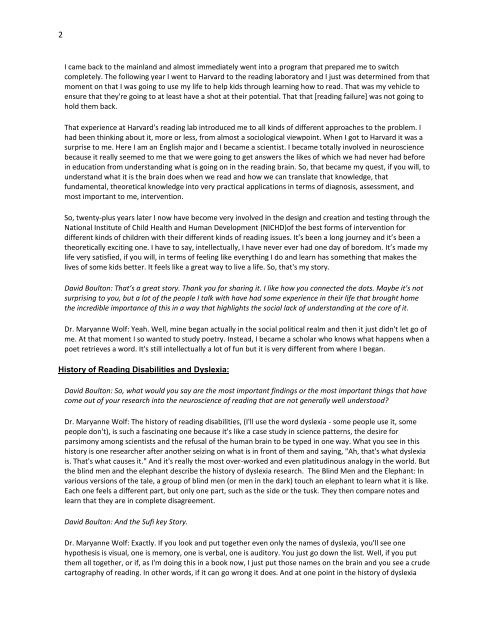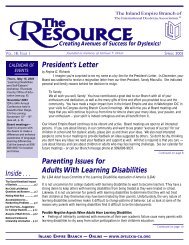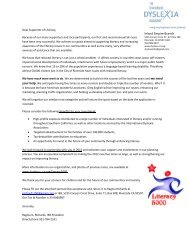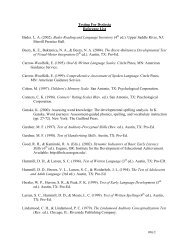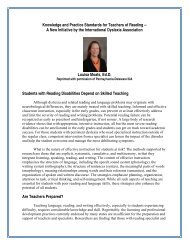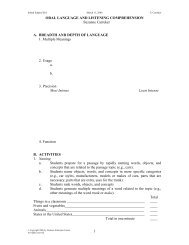An Interview with Dr Maryanne Wolf
An Interview with Dr. Maryanne Wolf
An Interview with Dr. Maryanne Wolf
You also want an ePaper? Increase the reach of your titles
YUMPU automatically turns print PDFs into web optimized ePapers that Google loves.
2<br />
I came back to the mainland and almost immediately went into a program that prepared me to switch<br />
completely. The following year I went to Harvard to the reading laboratory and I just was determined from that<br />
moment on that I was going to use my life to help kids through learning how to read. That was my vehicle to<br />
ensure that they're going to at least have a shot at their potential. That that [reading failure] was not going to<br />
hold them back.<br />
That experience at Harvard's reading lab introduced me to all kinds of different approaches to the problem. I<br />
had been thinking about it, more or less, from almost a sociological viewpoint. When I got to Harvard it was a<br />
surprise to me. Here I am an English major and I became a scientist. I became totally involved in neuroscience<br />
because it really seemed to me that we were going to get answers the likes of which we had never had before<br />
in education from understanding what is going on in the reading brain. So, that became my quest, if you will, to<br />
understand what it is the brain does when we read and how we can translate that knowledge, that<br />
fundamental, theoretical knowledge into very practical applications in terms of diagnosis, assessment, and<br />
most important to me, intervention.<br />
So, twenty-plus years later I now have become very involved in the design and creation and testing through the<br />
National Institute of Child Health and Human Development (NICHD)of the best forms of intervention for<br />
different kinds of children <strong>with</strong> their different kinds of reading issues. It’s been a long journey and it’s been a<br />
theoretically exciting one. I have to say, intellectually, I have never ever had one day of boredom. It’s made my<br />
life very satisfied, if you will, in terms of feeling like everything I do and learn has something that makes the<br />
lives of some kids better. It feels like a great way to live a life. So, that's my story.<br />
David Boulton: That’s a great story. Thank you for sharing it. I like how you connected the dots. Maybe it's not<br />
surprising to you, but a lot of the people I talk <strong>with</strong> have had some experience in their life that brought home<br />
the incredible importance of this in a way that highlights the social lack of understanding at the core of it.<br />
<strong>Dr</strong>. <strong>Maryanne</strong> <strong>Wolf</strong>: Yeah. Well, mine began actually in the social political realm and then it just didn't let go of<br />
me. At that moment I so wanted to study poetry. Instead, I became a scholar who knows what happens when a<br />
poet retrieves a word. It's still intellectually a lot of fun but it is very different from where I began.<br />
History of Reading Disabilities and Dyslexia:<br />
David Boulton: So, what would you say are the most important findings or the most important things that have<br />
come out of your research into the neuroscience of reading that are not generally well understood?<br />
<strong>Dr</strong>. <strong>Maryanne</strong> <strong>Wolf</strong>: The history of reading disabilities, (I'll use the word dyslexia - some people use it, some<br />
people don't), is such a fascinating one because it's like a case study in science patterns, the desire for<br />
parsimony among scientists and the refusal of the human brain to be typed in one way. What you see in this<br />
history is one researcher after another seizing on what is in front of them and saying, "Ah, that's what dyslexia<br />
is. That's what causes it." <strong>An</strong>d it's really the most over-worked and even platitudinous analogy in the world. But<br />
the blind men and the elephant describe the history of dyslexia research. The Blind Men and the Elephant: In<br />
various versions of the tale, a group of blind men (or men in the dark) touch an elephant to learn what it is like.<br />
Each one feels a different part, but only one part, such as the side or the tusk. They then compare notes and<br />
learn that they are in complete disagreement.<br />
David Boulton: <strong>An</strong>d the Sufi key Story.<br />
<strong>Dr</strong>. <strong>Maryanne</strong> <strong>Wolf</strong>: Exactly. If you look and put together even only the names of dyslexia, you'll see one<br />
hypothesis is visual, one is memory, one is verbal, one is auditory. You just go down the list. Well, if you put<br />
them all together, or if, as I'm doing this in a book now, I just put those names on the brain and you see a crude<br />
cartography of reading. In other words, if it can go wrong it does. <strong>An</strong>d at one point in the history of dyslexia


